Outreach
 Unveiling Progress: STEEPing Towards PFAS Solutions – 2024 Annual Report - The 2024 annual report for the University of Rhode Island STEEP (Sources, Transport, Exposure & Effects of PFAS) Superfund Research Program, funded by the National Institute of Environmental Health Sciences, serves as a comprehensive overview… ...Read more
Unveiling Progress: STEEPing Towards PFAS Solutions – 2024 Annual Report - The 2024 annual report for the University of Rhode Island STEEP (Sources, Transport, Exposure & Effects of PFAS) Superfund Research Program, funded by the National Institute of Environmental Health Sciences, serves as a comprehensive overview… ...Read more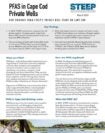 PFAS in Cape Cod Private Wells: New Findings from STEEP’s Private Well Study (March 2024) - Key findings from private well water samples from across Cape Cod as well as information about how PFAS are regulated in Massachusetts and guidance for private well owners. Read the report. Supplemental Data for information… ...Read more
PFAS in Cape Cod Private Wells: New Findings from STEEP’s Private Well Study (March 2024) - Key findings from private well water samples from across Cape Cod as well as information about how PFAS are regulated in Massachusetts and guidance for private well owners. Read the report. Supplemental Data for information… ...Read more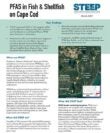 PFAS in Fish & Shellfish on Cape Cod (March 2024) - Key findings from samples of 24 common fish and shellfish species that were collected from popular fishing locations on Cape Cod and information about how to limit PFAS exposures from fish. Samples were analyzed to… ...Read more
PFAS in Fish & Shellfish on Cape Cod (March 2024) - Key findings from samples of 24 common fish and shellfish species that were collected from popular fishing locations on Cape Cod and information about how to limit PFAS exposures from fish. Samples were analyzed to… ...Read more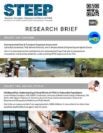 STEEP Research Brief – 2024 - A summary of STEEP's major focus areas of: exposure, critical health effects, mechanisms, and detection. View the Research Brief ...Read more
STEEP Research Brief – 2024 - A summary of STEEP's major focus areas of: exposure, critical health effects, mechanisms, and detection. View the Research Brief ...Read more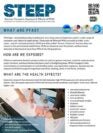 What Are PFAS? – 2024 - An PFAS explainer that outlines what PFAS are, how we are exposed to PFAS, what the health effects are, what you can do to limit exposure, and what the STEEP Superfund is doing to mitigate… ...Read more
What Are PFAS? – 2024 - An PFAS explainer that outlines what PFAS are, how we are exposed to PFAS, what the health effects are, what you can do to limit exposure, and what the STEEP Superfund is doing to mitigate… ...Read more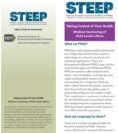 Taking Control of Your Health: Medical monitoring of PFAS health effects - What are PFAS? How am I exposed to them? What are the effects of PFAS on the human body? What actions can I take? View the Report ...Read more
Taking Control of Your Health: Medical monitoring of PFAS health effects - What are PFAS? How am I exposed to them? What are the effects of PFAS on the human body? What actions can I take? View the Report ...Read more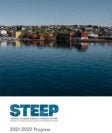 PFAS Frontiers: Insights from the 2022 STEEP Annual Report - https://web.uri.edu/steep/wp-content/uploads/sites/1022/2022_STEEP_Annual_Rpt.pdf ...Read more
PFAS Frontiers: Insights from the 2022 STEEP Annual Report - https://web.uri.edu/steep/wp-content/uploads/sites/1022/2022_STEEP_Annual_Rpt.pdf ...Read more STEEP Progress on the PFAS Challenge: Protecting Human and Environmental Health – Fall 2021 Progress - This report provides an overview of STEEP’s Year 4 progress through research that aims to better understand the pathways of PFAS contamination from entry into the environment through groundwater contamination, dispersal through the food web, and… ...Read more
STEEP Progress on the PFAS Challenge: Protecting Human and Environmental Health – Fall 2021 Progress - This report provides an overview of STEEP’s Year 4 progress through research that aims to better understand the pathways of PFAS contamination from entry into the environment through groundwater contamination, dispersal through the food web, and… ...Read more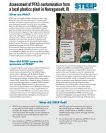 Assessment of PFAS contamination from a local plastics plant in Narragansett, RI - In response to community concerns about odors and potential PFAS contamination, STEEP scientists collected environmental samples (soil, air, water) from locations near the DeWAL-Rogers plastics plant in Narragansett, RI and in surrounding neighborhoods. Samples were… ...Read more
Assessment of PFAS contamination from a local plastics plant in Narragansett, RI - In response to community concerns about odors and potential PFAS contamination, STEEP scientists collected environmental samples (soil, air, water) from locations near the DeWAL-Rogers plastics plant in Narragansett, RI and in surrounding neighborhoods. Samples were… ...Read more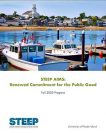 STEEP Aims: Renewed Commitment for the Public Good – Fall 2020 Progress - This report provides an overview of STEEP’s Year 3 progress through research that aims to better understand the pathways of PFAS contamination from entry into the environment through groundwater contamination, dispersal through the food web,… ...Read more
STEEP Aims: Renewed Commitment for the Public Good – Fall 2020 Progress - This report provides an overview of STEEP’s Year 3 progress through research that aims to better understand the pathways of PFAS contamination from entry into the environment through groundwater contamination, dispersal through the food web,… ...Read more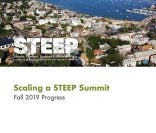 Scaling a STEEP Summit – Fall 2019 Progress - STEEP researchers, core leads, and trainees report on progress to date and plans for the upcoming year, highlighting the PFAS insights STEEP has gleaned and how the team plans to continue to expand its research,… ...Read more
Scaling a STEEP Summit – Fall 2019 Progress - STEEP researchers, core leads, and trainees report on progress to date and plans for the upcoming year, highlighting the PFAS insights STEEP has gleaned and how the team plans to continue to expand its research,… ...Read more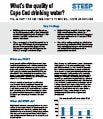 What’s the quality of Cape Cod drinking water? Preliminary Findings From STEEP’s Private Well Study on Cape Cod - STEEP tested untreated water samples from 101 private wells in 12 towns across Cape Cod. Water samples were analyzed for 25 PFAS chemicals, including the 5 PFAS chemicals in the Massachusetts drinking water guideline. Also… ...Read more
What’s the quality of Cape Cod drinking water? Preliminary Findings From STEEP’s Private Well Study on Cape Cod - STEEP tested untreated water samples from 101 private wells in 12 towns across Cape Cod. Water samples were analyzed for 25 PFAS chemicals, including the 5 PFAS chemicals in the Massachusetts drinking water guideline. Also… ...Read more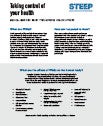 Taking control of your health: Medical Monitoring of PFAS Adverse Health Effects - A number of studies have shown links between higher PFAS levels and the likelihood of adverse health effects. This does not mean that all people exposed to PFAS will develop these health problems, but the… ...Read more
Taking control of your health: Medical Monitoring of PFAS Adverse Health Effects - A number of studies have shown links between higher PFAS levels and the likelihood of adverse health effects. This does not mean that all people exposed to PFAS will develop these health problems, but the… ...Read more Tips for Well Owners - How Am I Exposed to PFAS? 98% of Americans have PFAS - human-made chemicals common in water-resistant and non-stick products - In their blood. One source of exposure can be drinking water. The U.S. EPA… ...Read more
Tips for Well Owners - How Am I Exposed to PFAS? 98% of Americans have PFAS - human-made chemicals common in water-resistant and non-stick products - In their blood. One source of exposure can be drinking water. The U.S. EPA… ...Read more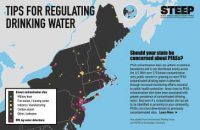 Tips for Regulating Drinking Water - Should your state be concerned about PFAS? PFAS contamination does not adhere to political boundaries and is not distributed evenly across the U.S. With over 170 known contamination sites, public concern is growing as more… ...Read more
Tips for Regulating Drinking Water - Should your state be concerned about PFAS? PFAS contamination does not adhere to political boundaries and is not distributed evenly across the U.S. With over 170 known contamination sites, public concern is growing as more… ...Read more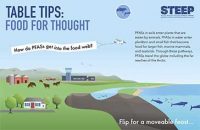 Table Tips: Food for Thought - How do PFAS get into the food web? PFAS in soils enter plants that are eaten by animals. PFAS in water enter plankton and small fish that become food for larger fish, marine mammals, and… ...Read more
Table Tips: Food for Thought - How do PFAS get into the food web? PFAS in soils enter plants that are eaten by animals. PFAS in water enter plankton and small fish that become food for larger fish, marine mammals, and… ...Read more Tips for Families - 98% of Americans have PFAS—human-made chemicals— in their blood. The most common exposure is through consumer products (think nonstick, stain resistant, waterproof, and greaseproof items). Some people have heightened exposure through drinking water, particularly if… ...Read more
Tips for Families - 98% of Americans have PFAS—human-made chemicals— in their blood. The most common exposure is through consumer products (think nonstick, stain resistant, waterproof, and greaseproof items). Some people have heightened exposure through drinking water, particularly if… ...Read more Tips for Infants - Thinking about, planning for, or even welcoming a new baby into your family? Every new parent wants to make the best preparations for their baby’s healthy development and growth. Here’s one more suggestion: check out… ...Read more
Tips for Infants - Thinking about, planning for, or even welcoming a new baby into your family? Every new parent wants to make the best preparations for their baby’s healthy development and growth. Here’s one more suggestion: check out… ...Read more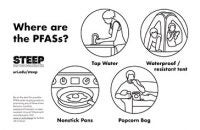 STEEP Coloring Sheets - ...Read more
STEEP Coloring Sheets - ...Read more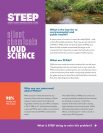 Silent Chemicals. Loud Science. - STEEP is dedicated to better understanding the path that toxic PFAS take as they spread from entry into the environment through groundwater, and work their way from tiny animals into larger ones, including humans. Learn… ...Read more
Silent Chemicals. Loud Science. - STEEP is dedicated to better understanding the path that toxic PFAS take as they spread from entry into the environment through groundwater, and work their way from tiny animals into larger ones, including humans. Learn… ...Read more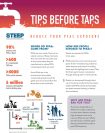 Tips Before Taps — Reduce Your PFAS Exposure - People are exposed to PFAS in a couple of ways. PFAS enter the environment at several types of sites—manufacturing, industrial, waste disposal, and airports or military bases were fire fighting foam is used. They find… ...Read more
Tips Before Taps — Reduce Your PFAS Exposure - People are exposed to PFAS in a couple of ways. PFAS enter the environment at several types of sites—manufacturing, industrial, waste disposal, and airports or military bases were fire fighting foam is used. They find… ...Read more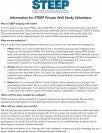 Information for STEEP Private Well Study Volunteers - STEEP is testing 250 private wells across Cape Cod over the next five years to provide residents with a better understanding of the extent of PFAS exposure and contamination. The STEEP FAQ answers common questions… ...Read more
Information for STEEP Private Well Study Volunteers - STEEP is testing 250 private wells across Cape Cod over the next five years to provide residents with a better understanding of the extent of PFAS exposure and contamination. The STEEP FAQ answers common questions… ...Read more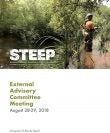 STEEP Reports on Progress to Date and Plans for the Upcoming Year - Researchers, core leads, and trainees recently reported to STEEP's External Advisory Committee, highlighting the PFAS insights STEEP has gleaned and how the team plans to continue and expand its research, engagement, and graduate training. RTC… ...Read more
STEEP Reports on Progress to Date and Plans for the Upcoming Year - Researchers, core leads, and trainees recently reported to STEEP's External Advisory Committee, highlighting the PFAS insights STEEP has gleaned and how the team plans to continue and expand its research, engagement, and graduate training. RTC… ...Read more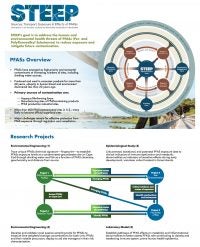 An overview of the University of Rhode Island’s Sources, Transport, Exposure, & Effects of PFAS (STEEP) Superfund Research Program - An overview of the University of Rhode Island's STEEP Superfund Research Program, which is funded by the National Institute of Environmental Health Sciences Superfund Research Program and run in partnership with the Harvard T.H. Chan… ...Read more
An overview of the University of Rhode Island’s Sources, Transport, Exposure, & Effects of PFAS (STEEP) Superfund Research Program - An overview of the University of Rhode Island's STEEP Superfund Research Program, which is funded by the National Institute of Environmental Health Sciences Superfund Research Program and run in partnership with the Harvard T.H. Chan… ...Read more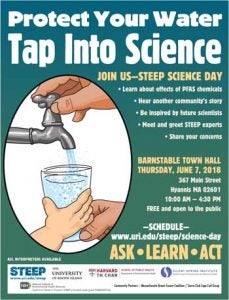 Protect your water – tap into science. - Promotional flyer to invite the Cape Cod community to STEEP Science Day on June 7, 2018. The focus of this event was to share information about PFAS chemicals, provide an opportunity for the community to… ...Read more
Protect your water – tap into science. - Promotional flyer to invite the Cape Cod community to STEEP Science Day on June 7, 2018. The focus of this event was to share information about PFAS chemicals, provide an opportunity for the community to… ...Read more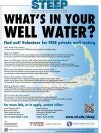 What’s in your well water? Find out! Volunteer for free private well testing. - Informational flyer to provide details of STEEP well water study and guidance on how Cape Cod residents can participate. The purpose of the study is to test for per- and polyfluoroalkyl substances (PFAS) in private… ...Read more
What’s in your well water? Find out! Volunteer for free private well testing. - Informational flyer to provide details of STEEP well water study and guidance on how Cape Cod residents can participate. The purpose of the study is to test for per- and polyfluoroalkyl substances (PFAS) in private… ...Read more

